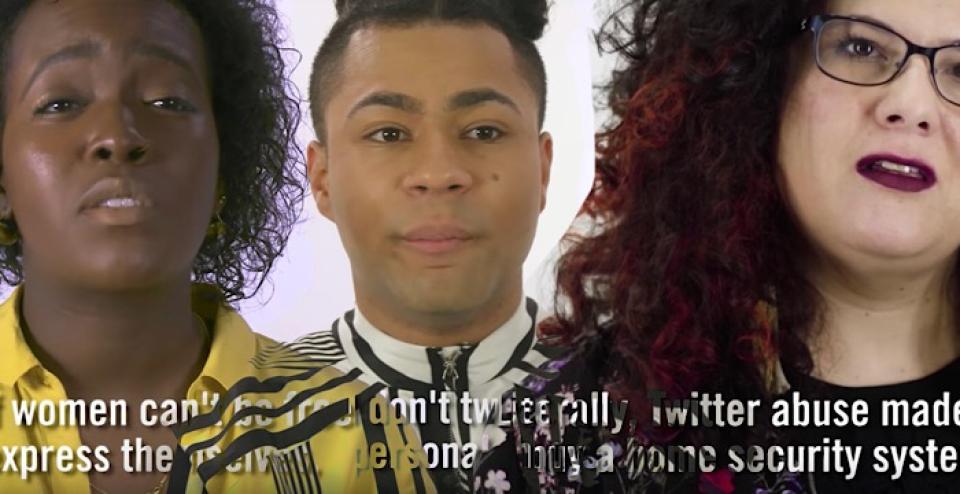
Collage of images from video report by Amnesty International on #TOXICTWITTER
As the world becomes increasingly connected online, our reliance on social media platforms such as Twitter has also become increasingly important. Every single day, billions of people around the world use social media to connect, debate, learn and share. As well as for everyday communications, social media platforms can help give a voice to the voiceless by raising the profile of some of the most marginalized groups in society. From high-level female politicians to journalists, activists, writers and bloggers, to women who simply want to know what’s happening around them – Twitter, in particular, can be a powerful tool for women to make connections and express themselves. In fact, the company has touted itself as a place where ‘every voice has the power to impact the world’.
But Twitter is also a platform where violence and abuse against women flourishes, often with little accountability. The widespread inequality and discrimination against women that remains embedded in society is increasingly being replicated online and acts of violence and abuse against women on Twitter and other social media platforms are an extension of these acts offline.

Still from video report by Amnesty International on #TOXICTWITTER
The violence and abuse many women experience on Twitter has a detrimental effect on their right to express themselves equally, freely and without fear. Instead of strengthening women’s voices, the violence and abuse many women experience on the platform leads women to self-censor what they post, limit their interactions, and even drives women off Twitter completely. At a watershed moment when women around the world are using their collective power to speak out and amplify their voices through social media platforms, Twitter’s failure to adequately respect human rights and effectively tackle violence and abuse on the platform means that instead of women using their voices ‘to impact the world’, many women are instead being pushed backwards to a culture of silence.
Twitter’s failure to adequately respect human rights and effectively tackle violence and abuse on the platform means that instead of women using their voices ‘to impact the world’, many women are instead being pushed backwards to a culture of silence.
The aim of violence and abuse is to create a hostile online environment for women with the goal of shaming, intimidating, degrading, belittling or silencing women. Women are targeted with violence and abuse on Twitter for a variety of different reasons. Sometimes it is for speaking out about certain (often feminist) issues and sometimes it is because they are public figures. Although people of all genders can experience violence and abuse online, the abuse experienced by women is often sexist or misogynistic in nature, and online threats of violence against women are often sexualized and include specific references to women’s bodies.
The aim of violence and abuse is to create a hostile online environment for women with the goal of shaming, intimidating, degrading, belittling or silencing women.
Women who face discrimination because of their different identities offline often find that violence and abuse against them will target those same identities on Twitter. An individual’s race, religion or sexual orientation, for example, can have just as much of an effect as gender — if not more — on how that person is treated both in the physical and digital world. In the case of online violence and abuse, women of colour, religious or ethnic minority women, lesbian, bisexual, transgender or intersex (LBTI) women, women with disabilities, or non-binary individuals who do not conform to traditional gender norms of male and female, will often experience abuse that targets them in unique or compounded way.

Still from video report by Amnesty International on #TOXICTWITTER
The intersectional nature of online abuse against women on Twitter was evident in an Amnesty International analysis of online abuse against female parliamentarians in the UK. In September 2017, Amnesty worked with a data scientist to understand the level of online abuse against female parliamentarians in the UK who were active on Twitter between 1 January and 8 June 2017 and analysed a sample of Twitter data with a focus on the six weeks prior to the 8 June UK election in order to understand how many of the tweets sent to women MPs were abusive, whether some MPs were targeted more than others and if there were trends in such targeting. Our analysis found that in the six weeks prior to 8 June 2017, Diane Abbott, the first black female MP in the UK and current Shadow Home Secretary, received almost half or 45.14% of all abusive tweets against female MPs included in our study. Not only did she top the list of MPs for greatest number of abusive tweets received but she received 10 times more abuse than any other female MP in the run-up to the Election and eight times more abuse than any other female MP during the entire period of analysis. Even excluding Diane Abbott, black and Asian female MPs in Westminster received 35% more abusive tweets than white female MPs.
Our analysis found that in the six weeks prior to 8 June 2017, Diane Abbott, the first black female MP in the UK and current Shadow Home Secretary, received almost half or 45.14% of all abusive tweets against female MPs included in our study. Not only did she top the list of MPs for greatest number of abusive tweets received but she received 10 times more abuse than any other female MP in the run-up to the Election and eight times more abuse than any other female MP during the entire period of analysis.
Amnesty International interviewed dozens of women during our 16-month investigation into violence and abuse against women online. Female journalists, bloggers, politicians, activists as well as everyday users interviewed by Amnesty described the human rights impact of experiencing violence and abuse on Twitter and changing their behaviour on the platform due to the company’s failure to provide adequate remedy. At times, the threat of violence and abuse against women on Twitter, alone, leads to a chilling effect on women speaking out online. The silencing and censoring impact of violence and abuse against women on Twitter can have far-reaching and harmful repercussions on how younger women, women from marginalized communities, and future generations fully exercise their right to participate in public life and freely express themselves online.

Still from video report by Amnesty International on #TOXICTWITTER
Twitter has a responsibility to take concrete steps and actions to address any human rights abuses occurring on its platform. Part of this requires Twitter to have policies that are compliant with international human rights standards and to ensure that it has a robust reporting process that enables users to easily report any instances of violence and abuse. Yet, despite having policies that explicitly state that hateful conduct and abuse will not be tolerated on the platform, Twitter appears to be inadequately enforcing these policies when women report violence and abuse. Many of the women interviewed spoke about Twitter’s ineffective and inconsistent reporting process where reports of abuse were often met with inaction or silence from the platform.
Many of the women interviewed spoke about Twitter’s ineffective and inconsistent reporting process where reports of abuse were often met with inaction or silence from the platform. When women have had – or hear of people who have had – negative experiences reporting abuse to Twitter, they are often less likely to feel it is worth the effort to undertake the work of reporting abuse.
Transparency is a key component of Twitter’s human rights responsibilities. In this regard, Twitter’s reporting mechanisms must be accessible and transparent. It is impossible to assess the effectiveness of reporting mechanisms for social media platforms more generally when companies like Twitter give little information about their internal review processes, including, how complaints are dealt with, the ratio of company moderators to the volume of reports, the type and level of gender-and other identity based human rights training the staff receives and the time limits and targets for reviewing reports. One of the most pernicious impacts of the combination of inaction and inconsistency in responding to reports of abuse is the detrimental effect this has on women reporting experiences of abuse in the future. Women who are the targets of abuse already bear the burden of reporting it. This not only takes time, but also takes an emotional toll on women. When women have had – or hear of people who have had – negative experiences reporting abuse to Twitter, they are often less likely to feel it is worth the effort to undertake the work of reporting abuse.
One of the most pernicious impacts of the combination of inaction and inconsistency in responding to reports of abuse is the detrimental effect this has on women reporting experiences of abuse in the future.
Twitter has recently taken steps towards addressing the problem of violence and abuse against women on the platform. However, the steps it has taken are not sufficient to tackle the scale and nature of the problem. Women have the right to live free from discrimination and violence. They also have the right to freely express themselves, both online and offline. Twitter’s policies and – in particular – its practices clearly fail to respect these rights. As one of the world’s leading social media platforms with over 330 million monthly users, this failure has a serious impact as it contributes to the silencing of women’s voices online.

Still from video report by Amnesty International on #TOXICTWITTER
Violence and abuse against women on this scale does not have to exist on Twitter. In order for Twitter to adequately and effectively address this problem, the platform should publicly share comprehensive and meaningful information about the nature and levels of violence and abuse against women, as well as other groups, on the platform, and how they respond to it.
Violence and abuse against women on this scale does not have to exist on Twitter. In order for Twitter to adequately and effectively address this problem, the platform should publicly share comprehensive and meaningful information about the nature and levels of violence and abuse against women, as well as other groups, on the platform, and how they respond to it. The company should also improve its reporting mechanisms to ensure consistent application and a better response to complaints of violence and abuse. Lastly, Twitter should undertake far more proactive measures in educating users and raising awareness about security and privacy features on the platform that will help women create a safer, and less toxic Twitter experience. The company’s failure to adequately meet its human rights responsibilities in relation to violence and abuse will continue to silence women on the platform unless Twitter undertakes, with urgency, concrete steps to effectively tackle this problem.
Twitter is going to have to say whether they're for the people or they're not. Twitter has the power to change the way women and femmes are experiencing abuse, or even if we experience abuse, on their platform. After all, they are the convenors of the space and they have the power to change our experiences - Miski Noor, US Black Lives Matter activist
- 8979 views







Add new comment